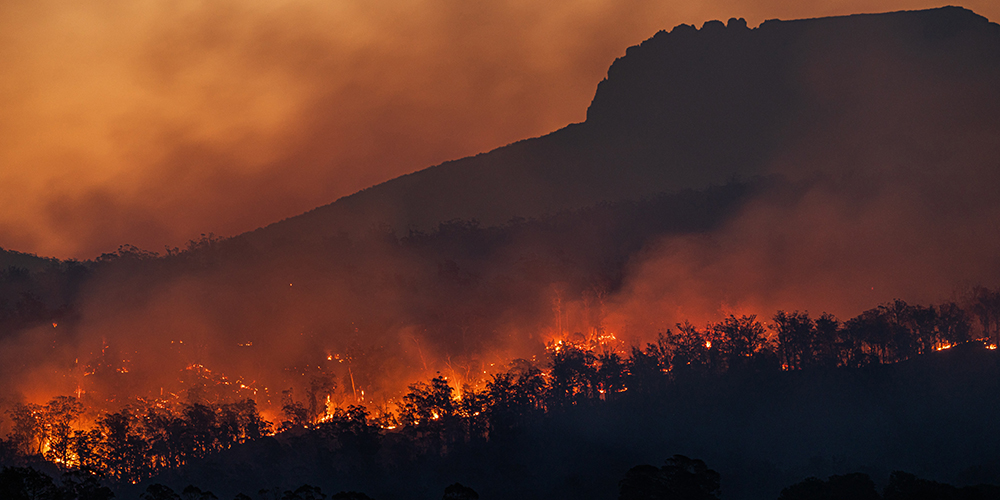9th August 2021

Response to the IPCC report
Today the Intergovernmental Panel on Climate Change (IPCC) has published a report on the impact of climate change worldwide.
The report comes with several warnings that we may exceed the global temperature increase of 1.5 degrees sooner than scientists originally expected. We are already seeing evidence of the climate emergency in all regions of the world. In the past two months alone there have been floods in Germany, China and the United Kingdom – plus wildfires in Canada, the United States and Greece. It is clear that climate change is accelerating.
Looking ahead
The report lays out different possibilities for climate futures and stresses the importance of immediate, rapid action to reduce greenhouse gas emissions in the next 20 years. It calls on urgent action from governments, businesses and civil society.
The IPCC report confirms that we still have the power to determine the future of the planet. It suggests that if globally, we achieve net zero emissions by 2050 and move to reduce concentrations of CO2 in the atmosphere, we are likely to significantly reduce climate impacts.
The sugarcane sector
Environmental issues are a high priority for our members and improving the environmental impact of sugarcane and addressing the climate emergency are key aims to the new Bonsucro 2021-2026 strategic plan. We have committed to work with members and partners on climate action – seeking to agree sector level commitments to GHG reduction targets for sugarcane production, science-based targets to a 1.5 degree pathway in accordance with the UNFCCC Paris Agreement on Climate Change by 2030.
We support our members to meet their GHG reduction targets through the Bonsucro Production Standard certification and have developed a Bonsucro GHG calculator to help producers to manage GHG emissions. We provide access to data and knowledge, and we want to align with green financing opportunities and other partnerships to accelerate the transition towards a net-zero and a climate-resilient future.
We will address the water crisis in key origins by partnering with members and others. We recently joined the Alliance for Water Stewardship (AWS) so that we can work together to develop and pilot water stewardship policies and create plans to manage water responsibly and equitably within the landscape.
Bonsucro members already commit to supporting forests and natural ecosystems when they sign the Code of Conduct. But we work with them to combat deforestation, and for the protection and maintenance of valuable ecosystems. We want to develop initiatives that aim to improve soil health and productivity. Last year we collaborated with the Earth Innovation Institute, Solidaridad Brazil and some of our producer members to research whether payment for environmental services schemes could benefit the sugarcane sector. We will endeavour to do more projects like this to help our members to move beyond reducing environmental impact towards regenerative agriculture.
Certification will continue to be a critical method to drive environmental sustainability. We have researched and improved the environmental indicators in our Production Standard during the revision process.
What’s more, in 2021 so far, the number of smallholder farmers achieving Bonsucro certification has doubled to over well over 10,000. We have worked on projects to train smallholder farmers on sustainability in Thailand and Pakistan and have an active project in Mexico. But we will increase this strand of our work.
With rising temperatures, heat stress puts workers at risk. There are immediate implications to working in hot conditions, such as illness from heatstroke, organ failure and even death. Heat stress has been identified as a leading cause of acute injuries and chronic illness among manual sugarcane cutters.
Bonsucro is a founding member of the Adelante Initiative – a collaborative programme that evaluates work practices and the introduces occupational health interventions for field workers. A Water, Rest, Shade and Sanitation protocol was designed by the Adelante Initiative that stipulates field workers should have regular breaks under shade, access to sufficient drinking water and sanitation. The protocol is incorporated in the Bonsucro Production Standard, meaning certified producers must assess the health risks at farms and provide enough water, rest and shade. Initial findings indicate a significant improvement in workers’ health and a positive return on investment for the mill based on net gain in productivity. We will continue to back research on heat stress and promote findings to our members and wider sugarcane sector.
The news from the IPCC report offers an alarming and dramatic outlook and urgent action is needed. Interest in Bonsucro and sustainable sugarcane is consistently growing. We are accelerating the sustainable production and uses of sugarcane and are ready to contribute our network, knowledge and influence to reducing the impact of the climate crisis.
If you are interested in working with us to address these issues in sugarcane, please email info@Bonscuro.com.





